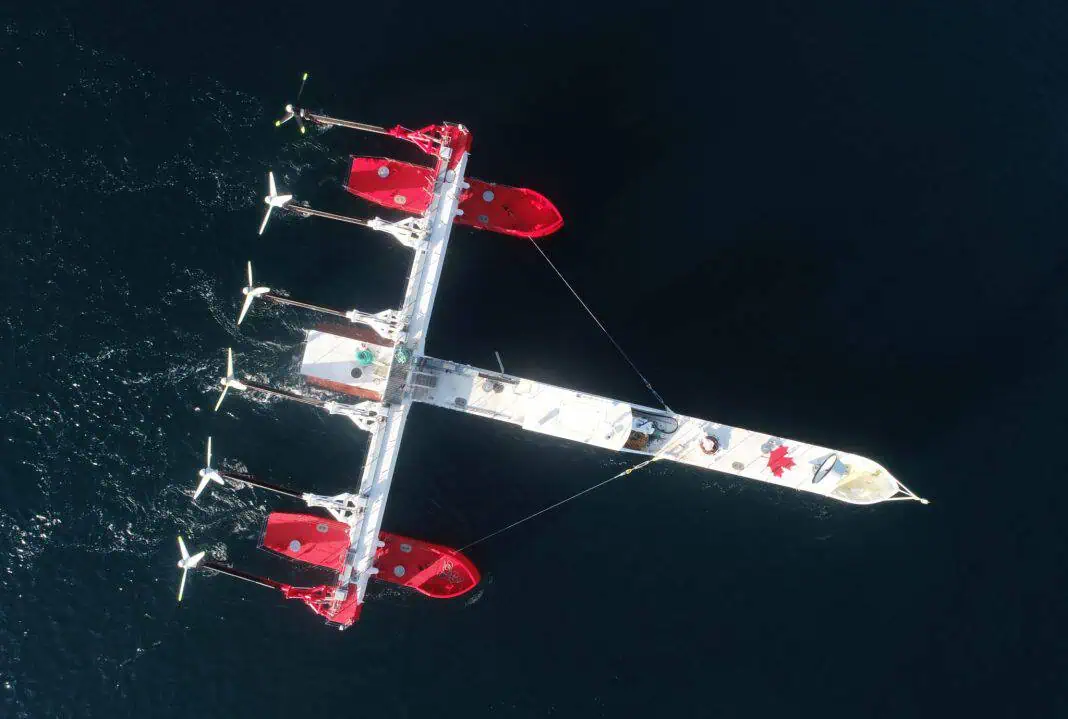Now these water masses will create electricity through the establishment of the world’s first floating tidal power array, the Pempa’q In-stream Tidal Energy Project. Seasystems contributes with mooring technology for the first phase being installed this autumn.
The Bay of Fundy on the east coast of Canada is famous for having the highest tides in the world which can provide predictable renewable energy. The daily replacements of water will now be used to produce electricity for the Canadian power grid.
Electricity for 3,000 homes
This year, Scottish Sustainable Marine will deliver the first development phase of the Pempa’q In-stream Tidal Energy Project – the world’s first floating tidal power array. When completed, the project will provide up to nine megawatts of electricity to the province’s power grid. This is enough to power around 3,000 homes and will reduce greenhouse gas emissions by 17,000 tonnes of CO2 annually.
The first phase consists of a 420-kilowatt PLAT-I tidal energy platform, and Seasystems AS has been commissioned to supply adjustable mooring tensioners. Lying on the seabed, these are attached to the anchors that hold the power station in place in the strong tidal current – connecting the anchor chains with the anchors.
“An exciting and important breakthrough for Seasystems”
“In the global transition to more sustainable forms of energy, it is extremely inspiring to take part in such a ground-breaking project as Pempa’q. This is the first mooring contract we secure within floating tidal power, representing an important breakthrough for the company. We are thrilled to be entering new and progressive markets across the vibrant renewable energy sector, contributing towards a sustainable, low-carbon future,” says Seasystems Managing Director, Torkjell Lisland.
For the past five years, the company has adjusted its strategy from being purely a supplier of equipment to the oil and gas industry to focusing on deliveries to aqua culture and floating renewable energy. In 2020, Seasystems secured a contract to supply mooring equipment to Hywind Tampen, Equinor’s new floating wind farm, marking the firm’s first hardware contract in the floating wind power market.
Teaming up with Swift Anchors

Seasystems has joined forces with Swift Anchors, a division of Sustainable Marine, in developing a unique hybrid mooring connector and anchor solution, specifically targeting wave, tidal, floating wind, floating solar, ocean thermal energy conversion, deep water aquaculture and other challenging anchor applications. This new solution, applied to the Pempa’q project, involves the integration of Seasystems’ adjustable mooring tensioners with Swift Anchors’ broad anchor product portfolio –including groutless rock anchors, screw anchors, drag embedment anchors and grouted self-drilling piles.
“Our latest venture with Swift Anchors will further catapult our business into the marine energy market,” Lisland says.
“We are pleased with our alliance with Seasystems, which has strong reputation for innovation in the maritime market, forming part of Scana ASA listed on the Oslo Stock Exchange. The integrated tensioning system significantly eases the installation process for any floating platform and provides increased flexibility in the mooring system design,” says Swift Anchors Managing Director, David Ainsworth. “
«Rise of the tide»
The Pempa’q In-stream Tidal Energy Project offers several benefits, both locally and globally. First and foremost, the tidal power plant will provide predictable, renewable, and clean energy. Globally, this means lower greenhouse gas emissions and less harmful effects on the climate and the environment. Locally, it means reduced dependency on coal as an energy source, and fewer harmful effects on the local environment.
The development also provides more skilled jobs in the province, and the location at the Fundy Ocean Research Centre for Energy means that there is already infrastructure in place to bring the electricity ashore and into the power grid. The name of the power development has been chosen to honour the indigenous communities around Fundy Bay. Pempa’q is the indigenous people Mi’kmaq First Nations’ word of the for “rise of the tide”.
Sources:
Torkjell Lisland, MD Seasystems
Sustainable Marine / Swift Anchors












